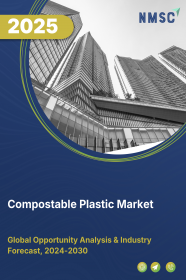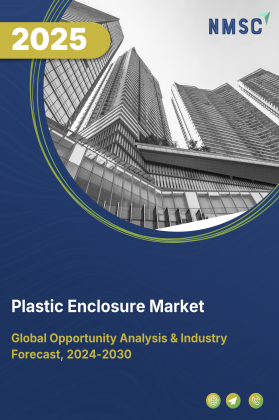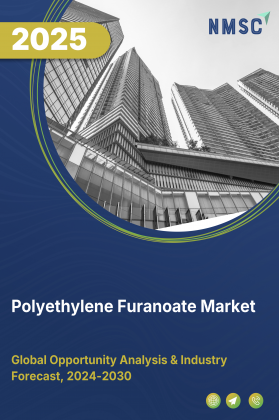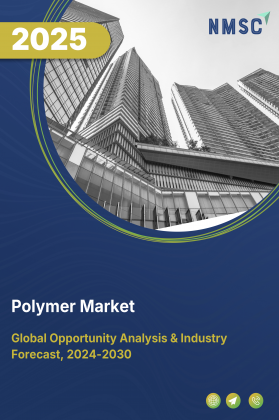
Compostable Plastic Market by Type (Home Compostable Plastic and Others), by Application (Compostable Cutlery, Compostable Bag, Compostable Straw, Compostable Gloves, Compostable Cup, Compostable Tray/Dish, and Others) by Product (Starch-Based, PLA, PHA, PBAT, and PBS), and by End-Use Industry (Packaging, Consumer Goods, Textile, Agriculture & Horticulture, and Others) - Global Opportunity Analysis and Industry Forecast, 2023–2030
Market Definition
The Compostable Plastic Market size was valued at USD 1.79 billion in 2022, and is predicted to reach USD 4.56 billion by 2030, with a CAGR of 12.4% from 2023 to 2030. Compostable bags are environment-friendly bags made of natural plant starch. They do not produce any toxic chemicals in the soil while decomposing. These are made from plants instead of petrochemicals obtained from fossil fuels. Compostable plastics are obtained from sustainable materials such as corn, potato, custard starches, cellulose, soy protein, and lactic corrosive. They are non-harmful, and can further break down into carbon dioxide, water, and biomass when treated with soil.
Market Dynamics and Trends
The demand for compostable plastic is increasing due to the rise in government initiatives to eliminate single-use plastic and the strict regulatory outlook against the use of conventional plastic products. This factor is expected to drive the compostable plastic market. For instance, in 2020, the German government announced a ban on the sale of single-use plastic products such as cutlery, straws, food containers, and other similar products from mid-2021 onwards to minimize plastic across the country.
Also, in 2020, China banned the use of non-biodegradable plastic bags in all major cities and towns that aimed to ban plastic in the entire country by the end of 2022 to minimize the adverse effects of plastics on the environment. In addition, the introduction of compostable plastic products in various regions by governments of various countries is expected to further propel the growth of the biodegradable plastic market. For instance, in December 2021, India’s Housing Minister Bhupendra Singh and Madhya Pradesh's Urban Development jointly launched Dular Kit, a compostable carry bag and homemade compost. It was launched under the initiative of Recycle, Reduce, Reuse.
However, the rise in the prices of compostable plastic coupled with a lack of skilled labor force are factors expected to restrain the growth of the compostable plastic market during the forecast period. On the contrary, Hemptensils, the first-ever plant-based disposable utensil made from hemp, is not harmful to the environment. Hemptensil forks, spoons, and knives are 100% bio-based and compostable. Such utensils are expected to create ample growth opportunities for the market in the coming years.
Market Segmentation and Scope of the Study
The compostable plastic market is segmented on the basis of type, application, product, end-use industry, and geography. On the basis of type, the market is divided into home compostable plastic and others. The home compostable plastic is sub-segmented into Bio PBS FD92, BWC BF 90A, and Ecopond Flex 162. On the basis of application, the market is categorized into compostable cutlery, compostable bag, compostable straw, compostable gloves, compostable cups, compostable trays/dishes, and others. On the basis of product, the market is classified into starch-based, PLA, PHA, PBAT, and PBS. On the basis of end-use industry, the market is divided into packaging, consumer goods, textile, agriculture & horticulture, and others. Geographic breakdown and analysis of each of the aforesaid segments include regions such as North America, Europe, Asia-Pacific, and RoW.
Geographical Analysis
North America holds the lion’s share of the compostable plastic industry at present and is expected to continue its dominance during the forecast period. The increasing innovation in the market regarding compostable disposable gloves that include Tri-Polymer Gloves fuels the market expansion. It is resistant to viruses, germs, and fungi, and has 90% degradation.
Moreover, the presence of leading market players that are adopting strategies such as product launches and others boosts the compostable plastic market growth in the region. For instance, in March 2021, World Centric announced a unique collection of certified compostable-molded fiber, single-use cutlery, and serving utensils. This collection of wood-free and plastic-free products offers the food service industry an environmentally-conscious option. It is suitable for a broad range of common food serving and meal prep uses. The currently available items include 6" and 3" spoons, 6" sporks, and 10" serving utensils capable of hot or cold use.
On the other hand, Europe is expected to show a steady rise in the biodegradable plastic market. The launches of compostable plastic products in the region by various key manufacturers boost market growth. For instance, in June 2020, EcoTensil launched a wide range of plastic-free paperboard utensils items such as cutlery, plates, and straws in Europe. This line of products is a versatile and cost-effective replacement for plastic utensils for food packaging.
Also, in March 2022, Huhtamaki OYJ strengthened its production capacity by stepping up the production of advanced and smooth-molded fiber packaging for food packaging. The company aims to provide a plastic-free packaging solution in Europe by strengthening its manufacturing capacities in molded fiber packaging.
Competitive Landscape
Various market players operating in the compostable plastic industry are BASF SE, Biome Technologies Plc, Corbion N.V., Danimer Scientific, Dow, Inc., Eastman Chemical Company, Kuraray Co., Ltd., Mitsubishi Chemical Holdings, Novamont S.P.A, And Ptt Global Chemical Company Limited. These market players are adopting various strategies, including the collaboration of their businesses across various regions, to maintain their dominance in the global market.
In September 2021, BASF and WPO Polymers collaborated for the distribution of Biopolymer Ecovio. WPO Polymers is a technical expert in the field of extrusion and possesses an in-depth knowledge of recycling and plastics materials. The organic Ecovio bags will be used as fruit and vegetable bags in Spain and Portugal.
Moreover, in December 2020, BASF and BillerudKorsnäs collaborated to develop a unique home-compostable paper laminate for flexible packaging. It consists of three basic components including ConFlex Silk, a sealing layer made of BASF’s certified home compostable & partly bio-based biopolymer ecovio, and water-based adhesive Epotal Eco 3675 X that joins the film to the paper. These can be used to produce wraps with individually-adjusted barrier properties such as cookies, ice cream, cereal bars, and dairy items.
Key Benefits
-
The compostable plastic market report provides a quantitative analysis of the current market estimations from 2022 to 2030. This analysis assists in identifying the prevailing market opportunities to capitalize on.
-
The study comprises a detailed analysis of thecurrent and future trends for depicting the prevalent investment pockets in the market.
-
The information related to key drivers, restraints, and opportunities and their impact on the compostable plastic market is provided in the report.
-
The competitive analysis of the market players along with their market share in the biodegradable plastic market is mentioned.
-
The SWOT analysis and Porter’s Five Forces model are elaborated on in the study.
-
The value chain analysis in the market study provides a clear picture of the stakeholders’ roles.
Compostable Plastic Market Key Segments
By Type
-
Home Compostable Plastic
-
BioPBS FD92
-
BWC BF 90A
-
Ecopond Flex 162
-
-
Others
By Application
-
Compostable Cutlery
-
Compostable Bag
-
Compostable Straw
-
Compostable Gloves
-
Compostable Cup (Cold Cup)
-
Compostable Tray/Dish
By Product
-
Starch-Based
-
PLA
-
PHA
-
PBAT
-
PBS
By End User
-
Packaging
-
Consumer Goods
-
Textile
-
Agriculture & Horticulture
-
Others
By Geography
-
North America
-
U.S.
-
Canada
-
Mexico
-
-
Europe
-
UK
-
Italy
-
Germany
-
Spain
-
Netherlands
-
Rest of Europe
-
-
Asia-Pacific
-
China
-
Japan
-
India
-
Australia
-
South Korea
-
Taiwan
-
Vietnam
-
Rest of Asia Pacific
-
-
RoW
-
Latin America
-
Middle East
-
Africa
-
Key Players
-
BASF SE
-
Biome Technologies Plc
-
Corbion N.V.
-
Danimer Scientific
-
Dow, Inc.
-
Eastman Chemical Company
-
Kuraray Co., Ltd.
-
Mitsubishi Chemical Holdings
-
Novamont S.P.A
-
Ptt Global Chemical Company Limited
REPORT SCOPE AND SEGMENTATION:
|
Parameters |
Details |
|
Market Size in 2022 |
USD 1.79 Billion |
|
Revenue Forecast in 2030 |
USD 4.56 Billion |
|
Growth Rate |
CAGR of 12.4% 2023 to 2030 |
|
Analysis Period |
2022–2030 |
|
Base Year Considered |
2021 |
|
Forecast Period |
2022–2030 |
|
Market Size Estimation |
Million (USD) |
|
Growth Factors |
|
|
Countries Covered |
28 |
|
Companies Profiled |
10 |
|
Market Share |
Available for 10 companies |
|
Customization Scope |
Free customization (equivalent to up to 80 working hours of analysts) after purchase. Addition or alteration to country, regional, and segment scope. |
|
Pricing and Purchase Options |
Avail customized purchase options to meet your exact research needs. |




















 Speak to Our Analyst
Speak to Our Analyst





















